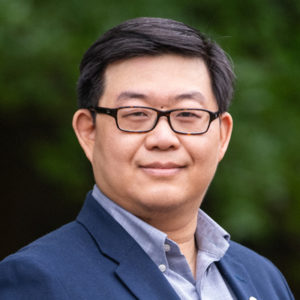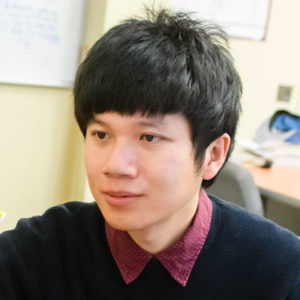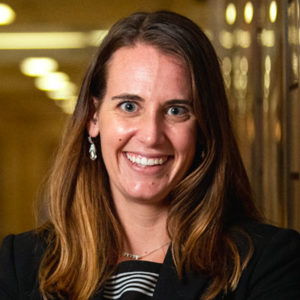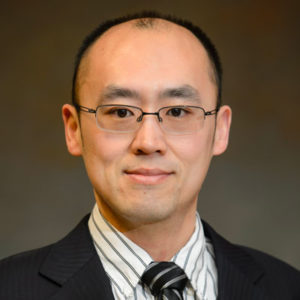Ten Times the Talent

Junior faculty score big in annual scramble for prestigious research awards
Ten assistant professors in the College of Engineering, Computing and Applied Sciences are starting the new academic year with a fresh infusion of research dollars after winning some of the nation’s most prestigious awards for junior faculty members.
Nine have received CAREER awards from the National Science Foundation, and one has secured an Early Career Research grant from the U.S. Department of Energy’s Office of Science.
Altogether, the awards represent nearly $5.6 million in funding across seven departments, all announced during the 2020-21 funding period. Research topics fall in a variety of categories, ranging from artificial intelligence and quantum computing to health innovation and advanced materials.
All of the CAREER award recipients have put together education plans to complement the research they will be doing. They expect to visit K-12 schools, create cutting-edge courses at Clemson and offer summer research opportunities for underrepresented students, to name a few examples.
“I am proud that Clemson University is a destination for top talent,” Clemson President Jim Clements said. “Our world-class faculty are known for excellence in cutting-edge scholarship and their passion for teaching and mentoring the next generation of innovators. Congratulations to this year’s award winners. They are the leaders of the future.”
Also offering his congratulations was Robert Jones, Clemson’s executive vice president for academic affairs and provost.
“The awards are a testament to the strength of Clemson’s research community and its commitment to creating the next generation of innovators and leaders,” Jones said. “By linking research and education we inspire students to become big thinkers who will be prepared to create jobs of the future and take on some of humanity’s most complex challenges.”
Daniel L. Noneaker, the college’s associate dean for research, said the awards highlight the high level of talent the college is attracting.
“Junior faculty members in the college have done an amazing job of securing high-profile grants, and I would like to congratulate each of this year’s recipients,” he said. “Many of the past winners of these awards have gone on to leadership positions in research and education. This news bodes well for the future of the college, the University and the state.”
The awards are a testament to the strength of Clemson’s research community and its commitment to creating the next generation of innovators and leaders.
Robert Jones — Clemson’s Executive Vice President for Academic Affairs and Provost
Anand Gramopadhye, the college’s dean, said each award is richly deserved and comes with nationwide recognition.
“These awards help launch junior faculty members’ careers and play a key role in positioning them as academic role models and mentors,” he said. “The awards also fuel innovation, foster partnerships and prepare the next generation of top talent. I offer all the recipients my heartfelt congratulations.”
Below is a brief look at each recipient. All have received CAREER awards, except Kai He, who received the Early Career Research grant.
Click their names to read full stories about their projects:

Angela Alexander-Bryant, of the Department of Bioengineering, is working to develop a new way of delivering medicines directly to cancer cells, raising hopes the disease could be treated more efficiently with fewer side effects. She is focusing on cancers that are aggressive and drug resistant, including ovarian cancer.

Kai He, of the Department of Materials Science and Engineering, is conducting research aimed at advancing quantum spintronics, a field that could revolutionize information technology. He and his team are using liquid nitrogen or helium to super-cool materials before looking at them in electron microscopes to see unique spin textures.

Bart Knijnenburg, of the School of Computing, is working on a recommender system that would help its users figure out their long-term goals and stay on path to achieving them. The system was inspired by the technology that recommends movies on Netflix and music on Spotify.

Yingjie Lao, of the Holcombe Department of Electrical and Computer Engineering, is strengthening the college’s portfolio of artificial-intelligence research with a new project aimed at protecting next-generation AI systems from attacks without sacrificing the systems’ performance, accuracy or complexity.

Jessica Larsen, of the Department of Chemical and Biomolecular Engineering, is conducting research aimed at finding new ways to diagnose GM1 gangliosidosis so that doctors can better determine the progression of the disease and offer the most effective treatment for its symptoms.

Judson Ryckman, of the Holcombe Department of Electrical and Computer Engineering, is making sensor chips with highly specific color-filtering surfaces and then shining a laser on them. The research is aimed at finding new ways to run a wide range of diagnostic tests without needing large, expensive scientific instruments.

Yongjia Song, of the Department of Industrial Engineering, is working to create a tool for emergency management officials that will show hurricane paths, their cones of uncertainty, what shelters should open and where relief items such as food and water should be sent over time.

Xin Zhao, of the Department of Mechanical Engineering, is conducting research that could help open new possibilities in manufacturing glass. For example, it could become possible to make eyeglasses that don’t fog up.

Ioannis Karamouzas, of the School of Computing, is developing new algorithms and navigation techniques for robots. The research focuses on helping indoor, mobile robots coexist with humans in populated areas, such as homes and workspaces.

Garrett Pataky, of the Department of Mechanical Engineering, will be taking a microscopic look at what happens when metal cracks, as he and his students launch new research that could lead to longer-lasting metal in everything from bridges to cars.